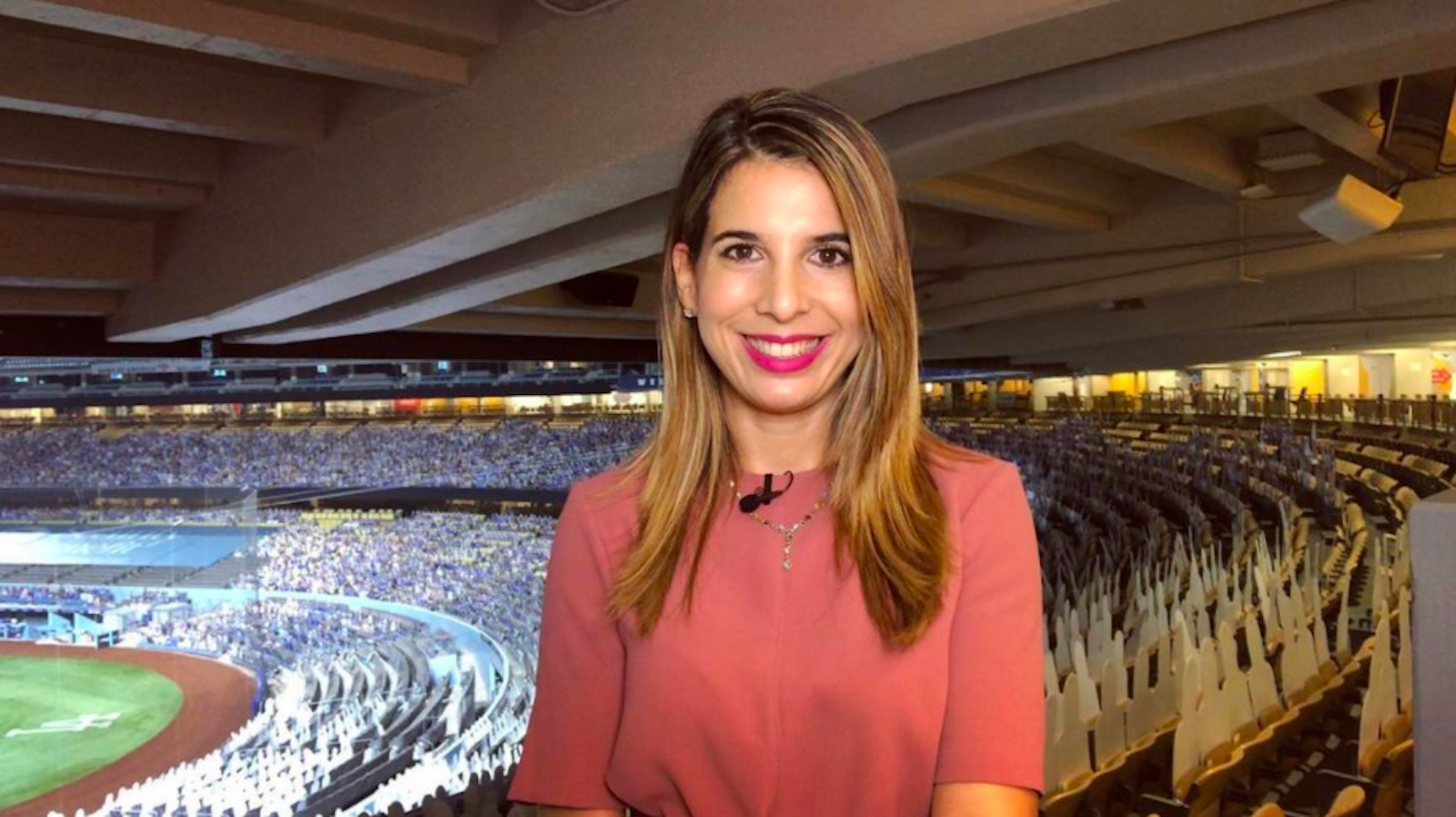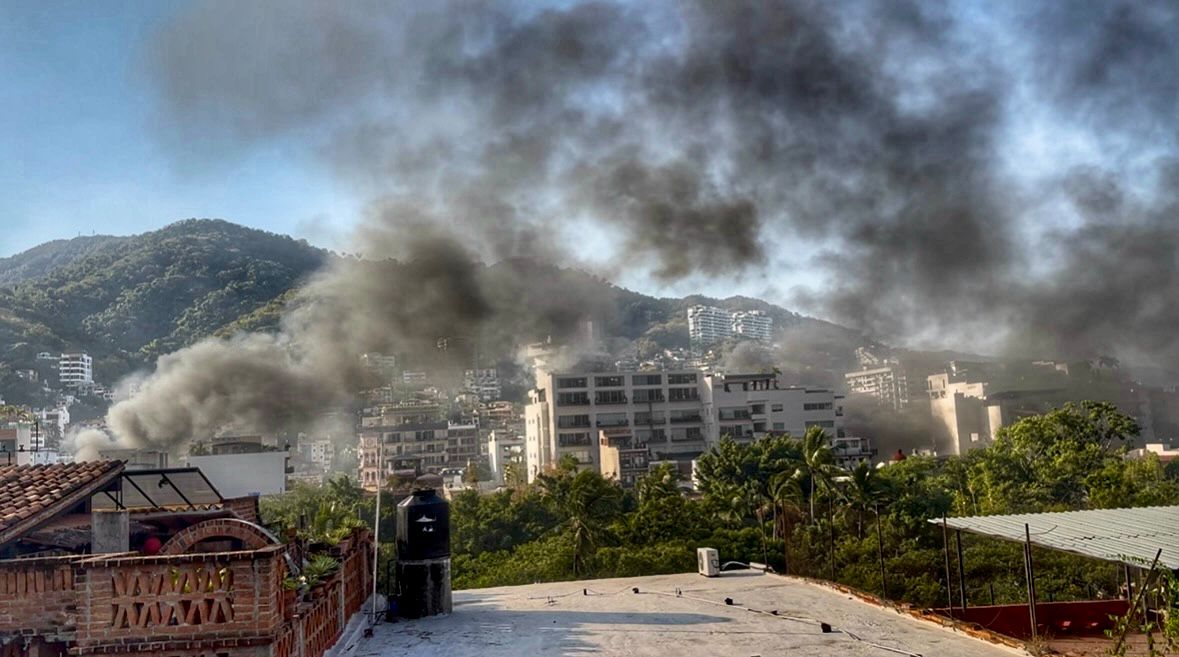[dropcap size=big]T[/dropcap]he last time I saw Katia Castorena, I was squished in the backseat of her sedan, gripping the arm handle above the right door for stability. It was 5 AM on New Year's Day 2019, and she gave my friends and me a jolty ride back to our hotel in Mexico City.
Castorena’s driving made us feel like we had fled the scene of a bank heist. We whizzed down the dark, empty streets on the bumpy ride from the Santa Fe neighborhood—where we welcomed the new year with Katia’s boyfriend’s family—back into the city. I saw that the speed and freedom of the open road thrilled Katia. She was in control and she knew where she was going.
And where Katia was always going was towards a career in sports.
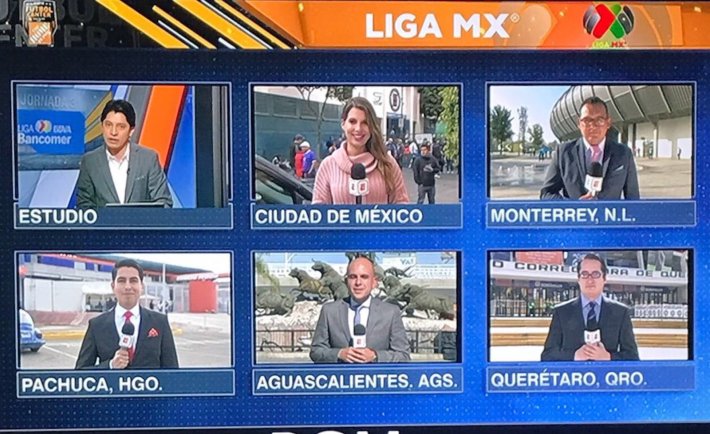
“I got that sports gene from my dad,” says Castorena, who grew up in Tijuana playing soccer. “ESPN was on pretty much all the time.” To this day, her dad turns on the TV when he gets home from work to watch the game highlights on ESPN. Only now, he sees his daughter relaying the updates.
She has a strong but soothing voice, long flowing hair, and a smile that takes up her whole face. As a rare woman in sports media, she is used to attracting surprised looks. The United Nations states that while women comprise 40 percent of athletes, they account for a meager 4 percent of sports reporting.
Castorena initially saw sports as a hobby. She studied communications at San Diego’s Southwestern College and then at the University of Southern California.
“It was a little bit of a shock,” recalls Castorena. She felt self-conscious when she first arrived at USC. Classmates constantly grilled her on where she was from because of her slight accent. When she’d say San Diego, her birthplace, they wouldn’t accept the answer. “And then I’d be like, Mexico?’" remembers Katia, still perplexed. “I felt like I had to say that in order for it to be okay.”
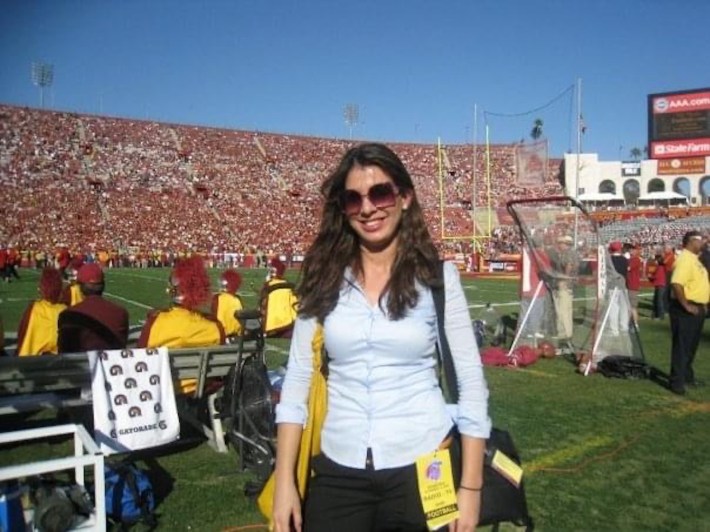
Castorena eventually found her community at USC. “She started coming to church with me because she grew up Catholic as well. We were really involved in volunteering and spending time with friends,” recalls her college roommate, Corrine Montana. “We were always wearing each other’s clothes. There’s probably so many pictures of me in college wearing Katia’s shorts or like, a scarf,” laughs Montana.
The Tijuanense realized she could combine her passion with her degree when she began to cover sports with the student-run station, Annenberg TV. Montana often trailed behind her roommate to USC college games, acting as her camerawoman. She remembers visiting a basketball practice to interview former coach, Kevin O’Neill, “...and the coach is just kind of like, ‘What are you doing here?’” He was confused by the female sports reporter.
“I looked around and it was all men.”
Castorena remembers the precise moment she realized she stood out. In 2010, she attended the PAC-12 College Basketball Tournament at the Staples Center through Annenberg TV. She joined her fellow media members for lunch around noon. “I looked around and it was all men.” But Castorena wasn’t intimidated by the testosterone. “It made me feel special. I was like, ‘Oh well, I’m here,’” she chuckles.
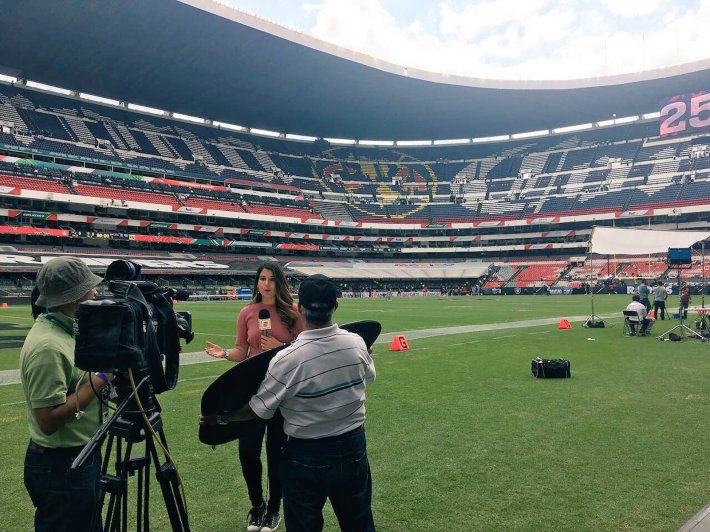
“I interviewed right after I graduated...with ESPN, but they were looking for a production assistant in Bristol, Connecticut,” remembers Katia. “In one of the interviews...the lady asked me what is it that I wanted to do. And I was like, 'Well, I want to be a [on-air] reporter,'” to which the interviewer responded, “Well, my advice would be to just focus on a job that will give you experience in exactly what you want to do.” So Castorena withdrew from the interview process.
She decided to capitalize on her Spanish and moved back to Mexico, a trend on the rise with bilingual, bicultural Mexican-Americans. She landed a job with Síntesis TV reporting on sports in her hometown. “[Tijuana] is actually a great region,” insists Castorena. “You get the best from both worlds.” With a first division professional soccer team and a big boxing scene, along with major sports teams in nearby San Diego and Los Angeles, the border city is an important, overlooked market.
“The thing is being on the border, I always say it’s a very peculiar phenomenon. It’s very unique because we literally have the best of both worlds. So you know, I went to school in Tijuana, but then I did summer camps or activities or things like that in San Diego,” says Castorena. “I can adapt.”
Moving back and forth between the two countries is second nature to the reporter. “The thing is being on the border, I always say it’s a very peculiar phenomenon. It’s very unique because we literally have the best of both worlds. So you know, I went to school in Tijuana, but then I did summer camps or activities or things like that in San Diego,” says Castorena. “I can adapt.”
Katia credits her hometown professional soccer team, Club Tijuana Xoloitzcuintles (“Los Xolos”) for her sudden career advancement. “They won a championship and they started being successful really fast,” she says. “That actually helped me because all of a sudden, there was a national or even international interest [in Tijuana].” ESPN Mexico needed more local coverage, so the Tijuanense became a freelance correspondent. ESPN liked her work so much that they recruited her to work full-time in Mexico City.
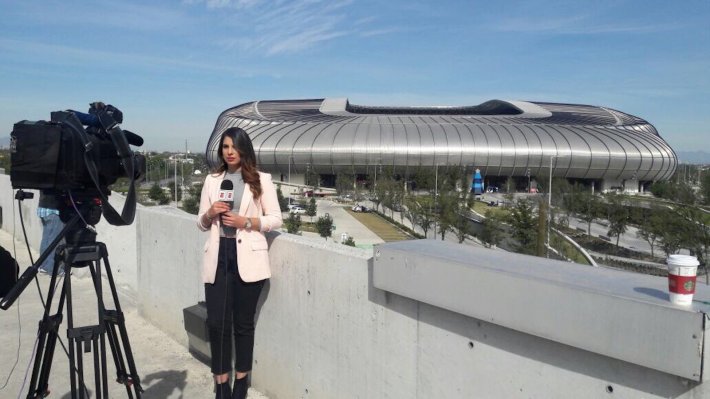
The megalopolis of 21 million people toughened her up. “I grew up as a professional and as a person as well,” says Castorena. “Covering the big teams, or even a national team, is, of course, one of the greatest honors...as a reporter.” But with little scheduled time for athletes to talk to the press, she had to get creative when finding stories. She camped outside of the Mexico City International Airport and soccer stadiums to catch players for a story or quote.
But the city was also isolating for the transplant. “Most of the time I was working,” she recalls. But on Sunday afternoons, she often realized “‘Oh...I'm gonna go have dinner by myself.’ Moments like that, it hits you.” Still, what Castorena loved about Mexico City is what she loves about sports: its competitive nature. “The concrete jungle. Survival of the fittest.” This is what fuels her passion for sports. “It always tells a story...that someone wins and someone loses.”
Competing for the best story was her sport. “Covering Los Xolos is not the same as covering the big [soccer] clubs in Mexico like América or Cruz Azul,” explains Castorena. “[Los Xolos] got that national or international attention because they won the championship...[or] whenever they would play certain games against these big clubs. Whereas when you’re covering América, it is a challenge because everything is news...If someone’s injured, Who’s gonna play? Who's not? Who are they signing? Are they firing the coach? Everything.”
From 2015 to 2019, Castorena traveled throughout Mexico, the United States, and Central América for ESPN Mexico, where she covered national and international athletes, from Mexico’s soccer star, Javier “Chicharito” Hernández to Swiss tennis god Roger Federer.
“I’m just doing my job....I'm not hitting on you...”
Her favorites interviews were those she conducted thanks to her English abilities. In 2017, Castorena covered the Formula One Grand Prix in Mexico City, an experience she describes as “glamourous” thanks to its luxury car-sponsored parties. But that’s not what she cared about. Castorena gushed when recounting the details of her one-on-one interview with British race car driver, Lewis Hamilton. “He’s an international figure, a multiple world champion. He’ll be remembered as one of the sport’s best. The fact that I was able to do not one but three one-on-one sit-downs with him as at his prime as the best driver, it’s super special.”
Today, Castorena claims that years of experience have taught her how to avoid uncomfortable encounters. “They [the athletes] automatically feel like if you want their number, it’s because you want something else,” explains Castorena. “I’m just doing my job....I'm not hitting on you. And with men, sometimes I feel like they can just talk to each other maybe in a different way. Maybe like ‘Güey, que pedo güey?’ [Dude, what’s up dude?]” she laughs. Castorena prioritizes her safety and well-being over a story and maintains a clear focus on sports, “And then your work speaks for itself.”
Castorena rose to Mexican ESPN stardom and amassed a huge fan base along the way. Today, she boasts tens of thousands of social media followers, has written hundreds of articles for ESPN Deportes, and estimates she has had over ten thousand hours of airtime.
Today, Castorena is back in Los Angeles for ESPN Deportes, the US-based network branch that serves the country’s 43 million Spanish speakers. She’s covered everything from Kobe Bryant’s tragic passing to Chicharito’s recent arrival to the LA Galaxy. During the pandemic, she primarily interviews players over Zoom, but she can’t wait for the approaching day where she can be back amongst the masses in a stadium.
“It's amazing that someone you know, my roommate and my friend, who is just a very sweet, humble person, took all these opportunities and made something amazing out of it,” remarks Montana. “So yeah, not surprised. But impressed.”
